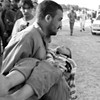I suppose he was wearing flip flops because he’s barefoot now, no more than 20 years old, in imitation Nike pants and a blue and black striped football shirt with a big 28 on the back. As the orderlies from the clinic pull the young fighter off the pickup, yellow fluid pours from his mouth. They flip him over, face up, the way into the clinic clearing in front of them, straight up the ramp into the makeshift morgue.
We wash the blood off our hands and get into the ambulance. There are people trapped in the other hospital who need to go to Baghdad. Siren screaming, lights flashing, we huddle on the floor of the ambulance, passports and ID cards held out the windows. We pack it with people, one with his chest taped together and a drip, one on a stretcher, legs jerking so violently that I have to hold them down as we wheel him out, lifting him over steps.
The hospital is better able to treat them than the clinic but it hasn’t got enough of anything to sort them out properly and the only way to get them to Baghdad is on our bus, which means they have to go to the clinic. We’re crammed on the floor of the ambulance in case it’s shot at. Nisareen, a woman doctor about my age, can’t stop a few tears once we’re out.
The doctor rushes out to meet me: “Can you go to fetch a lady? She is pregnant and she is delivering the baby too soon.”
Azzam, our contact with the mosque in Fallujah and our guide/protector, is driving. Ahmed, a local man volunteering at the hospital who came along to show us the way, is in the middle directing him, and I am by the window, the visible foreigner, the passport. Something scatters across my hand, simultaneous with the crashing of a bullet through the ambulance, some plastic part dislodged, flying through the window.
Attacked
We stop, turn off the siren, keep the blue light flashing, wait, eyes on the silhouettes of men in US marine uniforms on the corners of the buildings. Several shots come. We duck, get as low as possible and I can see tiny red lights whipping past the window, past my head. Some bullets—it’s hard to tell—are hitting the ambulance and I start singing. What else do you do when someone’s shooting at you? A tire bursts with an enormous noise and a jerk of the vehicle.
I’m outraged. We’re trying to get to a woman who’s giving birth without any medical attention, without electricity, in a city under siege, in a clearly marked ambulance, and you’re shooting at us. How dare you?
Azzam grabs the gear stick and gets the ambulance into reverse, another tire bursting as we go over the median in the center of the road, the shots still coming as we flee around the corner. I carry on singing. The wheels are scraping, burst rubber burning on the road.
The men from the clinic run for a stretcher as we arrive and I shake my head. They spot the new bullet holes and run to see if we’re OK. Is there any other way to get to her? I want to know. “La, maaku tarieq.” There is no other way. They say we did the right thing. They say they’ve fixed the ambulance four times already and they’ll fix it again but the radiator’s gone and the wheels are buckled and she’s still at home in the dark giving birth alone. I let her down.
We can’t go out again. For one thing there’s no ambulance. And besides, it’s dark now and that means our foreign faces can’t protect the people who go out with us or the people we pick up. Maki is the acting director of the place. He says he hated Saddam but now he hates the Americans more.
We take off the blue gowns as the sky starts exploding somewhere beyond the building opposite. Minutes later a car roars up to the clinic. I can hear a man screaming before I can see that there’s no skin left on his body. He’s burnt from head to foot. For sure there’s nothing they can do. He’ll die of dehydration within a few days. Another man is pulled from the car onto a stretcher. Cluster bombs, they say, although it’s not clear whether they mean one or both of them.


















